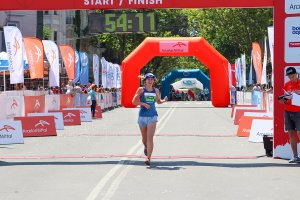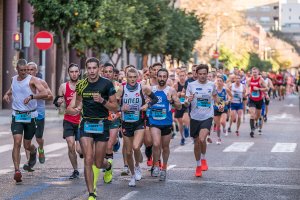How to Finish a Race Without Stopping

Some people will tell you that it’s better to quit when you can no longer go on… others will recommend that it’s best to finish the race without stopping. In this article, we’ll tell you how you can avoid stopping while running a race.
Finish a race without stopping: walk
Perhaps you’ve experienced that feeling when your legs no longer respond and, no matter how hard you try, you can’t advance another foot. Many athletes choose to ditch the race before injuring themselves or overloading their muscles.
However, another option could be to reduce the speed at which you’re running, veer off to the sidelines and walk. That way, you can keep a pace that’s fast enough to keep you from getting in the last place but slow enough so that you won’t hurt or overstrain yourself.
It’s imperative that you continue to move without stopping. If you stop, starting over will be almost impossible, because your body will already be discharging the adrenaline, and it’ll begin to enter the “resting mode.”
However, if you still think you can get more out of your legs, and you still want to finish the race, then the best alternative is to start walking. Thus, you’ll recover energy which will allow you to return to your previous pace gradually, or simply cross the finish line while jogging slightly.
If you do decide to walk during a race, pay attention to your teammates. Run slowly off to the sides so that nobody trips or bumps into you. This can be annoying and dangerous for someone else who’s keeping a good pace; having to stop for another person can subtract vital seconds off your finish time.
How to finish a race without stopping
If you ask a runner how they avoid stopping during a race, the most common answer you’ll get is “by preparing better.” This means that, in reality, everything that happens before the race or marathon is as much or more important than what happens during the competition.

If you don’t want to stop running while you’re in a race, listen to some of these tips:
1. Start slowly
Especially in marathons because they’re so extensive, if you start off running at full speed, likely, you’ll soon run out of energy and want to stop. In some cases, keeping the same pace as other runners is what helps determine your own speed. Either way, try to start slowly and increase your effort as the race goes on. You’ll see that this way, you’ll have more physical endurance to reach your goal.
2. Finish a race without stopping: hydrate sufficiently
Some say that drinking makes you more thirsty when you exercise, especially if you’re drinking sports drinks and not water. Besides, you should keep in mind that, the more fluid you have, the more you’ll want to go to the bathroom… and that’ll make you stop regardless!
This doesn’t mean that you can’t drink water throughout the race, but you must ration the consumption of liquids throughout the entire race. Don’t forget to urinate a few minutes before arriving at the starting line.
3. Eat light
It’s true that eating carbohydrates gives us the explosive energy we need to exercise (that’s why many athletes consume a plate of pasta before a competition). However, an excess of food can cause stomach discomfort, desire to defecate, or any other physiological effect that reduces your chances of finishing the race without stopping.
4. Don’t run while you’re injured or sore
We think that when we start running, our muscles will warm up, and the pain will magically disappear. However, an injury can appear at the most inappropriate time.
To avoid stopping during the race, we recommend that you don’t start one if you aren’t very physically fit. The same goes for training sessions.

5. Finish a race without stopping: be constant and rest
It doesn’t matter how many miles the next race you want to do involves, or how much time you have left before it starts. You must get enough training beforehand… there are no valid excuses.
Of course, that doesn’t mean that you should run every day. If you do more than your body can take, you’ll end up becoming injured. Taking breaks between sessions is essential for you to be 100 percent prepared on race day.
If you want to finish an entire race without stopping, we also advise that you choose a correct training plan, workout at the gym on predetermined specific dates and listen to what your body needs before you start a race. Don’t start running long distances races if you aren’t trained.
Some people will tell you that it’s better to quit when you can no longer go on… others will recommend that it’s best to finish the race without stopping. In this article, we’ll tell you how you can avoid stopping while running a race.
Finish a race without stopping: walk
Perhaps you’ve experienced that feeling when your legs no longer respond and, no matter how hard you try, you can’t advance another foot. Many athletes choose to ditch the race before injuring themselves or overloading their muscles.
However, another option could be to reduce the speed at which you’re running, veer off to the sidelines and walk. That way, you can keep a pace that’s fast enough to keep you from getting in the last place but slow enough so that you won’t hurt or overstrain yourself.
It’s imperative that you continue to move without stopping. If you stop, starting over will be almost impossible, because your body will already be discharging the adrenaline, and it’ll begin to enter the “resting mode.”
However, if you still think you can get more out of your legs, and you still want to finish the race, then the best alternative is to start walking. Thus, you’ll recover energy which will allow you to return to your previous pace gradually, or simply cross the finish line while jogging slightly.
If you do decide to walk during a race, pay attention to your teammates. Run slowly off to the sides so that nobody trips or bumps into you. This can be annoying and dangerous for someone else who’s keeping a good pace; having to stop for another person can subtract vital seconds off your finish time.
How to finish a race without stopping
If you ask a runner how they avoid stopping during a race, the most common answer you’ll get is “by preparing better.” This means that, in reality, everything that happens before the race or marathon is as much or more important than what happens during the competition.

If you don’t want to stop running while you’re in a race, listen to some of these tips:
1. Start slowly
Especially in marathons because they’re so extensive, if you start off running at full speed, likely, you’ll soon run out of energy and want to stop. In some cases, keeping the same pace as other runners is what helps determine your own speed. Either way, try to start slowly and increase your effort as the race goes on. You’ll see that this way, you’ll have more physical endurance to reach your goal.
2. Finish a race without stopping: hydrate sufficiently
Some say that drinking makes you more thirsty when you exercise, especially if you’re drinking sports drinks and not water. Besides, you should keep in mind that, the more fluid you have, the more you’ll want to go to the bathroom… and that’ll make you stop regardless!
This doesn’t mean that you can’t drink water throughout the race, but you must ration the consumption of liquids throughout the entire race. Don’t forget to urinate a few minutes before arriving at the starting line.
3. Eat light
It’s true that eating carbohydrates gives us the explosive energy we need to exercise (that’s why many athletes consume a plate of pasta before a competition). However, an excess of food can cause stomach discomfort, desire to defecate, or any other physiological effect that reduces your chances of finishing the race without stopping.
4. Don’t run while you’re injured or sore
We think that when we start running, our muscles will warm up, and the pain will magically disappear. However, an injury can appear at the most inappropriate time.
To avoid stopping during the race, we recommend that you don’t start one if you aren’t very physically fit. The same goes for training sessions.

5. Finish a race without stopping: be constant and rest
It doesn’t matter how many miles the next race you want to do involves, or how much time you have left before it starts. You must get enough training beforehand… there are no valid excuses.
Of course, that doesn’t mean that you should run every day. If you do more than your body can take, you’ll end up becoming injured. Taking breaks between sessions is essential for you to be 100 percent prepared on race day.
If you want to finish an entire race without stopping, we also advise that you choose a correct training plan, workout at the gym on predetermined specific dates and listen to what your body needs before you start a race. Don’t start running long distances races if you aren’t trained.
All cited sources were thoroughly reviewed by our team to ensure their quality, reliability, currency, and validity. The bibliography of this article was considered reliable and of academic or scientific accuracy.
- Geiringer, S. R. (1995). The biomechanics of running. Journal of Back and Musculoskeletal Rehabilitation. https://doi.org/10.1016/1053-8127(95)00140-J
This text is provided for informational purposes only and does not replace consultation with a professional. If in doubt, consult your specialist.








